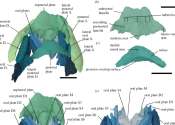3D mouth of an ancient jawless fish suggests they were filter-feeders, not scavengers or hunters
Early jawless fish were likely to have used bony projections surrounding their mouths to modify their mouth shape while they collected food.

Early jawless fish were likely to have used bony projections surrounding their mouths to modify their mouth shape while they collected food.
Evolution
Apr 10, 2024
0
96

Two potential new species of lamprey fish have been discovered in California waters, according to a University of California, Davis, study. The research is part of a special section on native lampreys published this week ...
Plants & Animals
Jan 17, 2024
0
52

For nearly 50 years, a jawless fish called the lamprey has interested scientists because of its remarkable ability to recover from spinal cord injuries. A new study reveals a possible technique lampreys may use to swim again, ...
Biotechnology
Apr 1, 2023
0
249

More than half of Switzerland's native fish species are threatened with extinction or are already extinct within the country's waters, a new assessment showed Wednesday.
Ecology
Feb 8, 2023
0
24

Using the lamprey, researchers from Japan analyzed the photosensory mechanism of the pineal organ, also called the pineal gland, in non-mammalian vertebrates and discovered a novel mechanism of pineal color discrimination ...
Evolution
Sep 16, 2021
0
20

A joint team of paleontologists has now for the first time analyzed bone structures in 400 million-year-old fossils of marine life at unprecedentedly high resolution and in 3D. To be able to view these structures, tomography ...
Evolution
Mar 31, 2021
0
263

Mice, fruit flies and dogs are common creatures of laboratories across the country, valuable to researchers for their genetic proximity to humans. But what about lampreys?
Biotechnology
Dec 17, 2020
0
474

The emergence of jaws in primitive fish allowed vertebrates to become top predators. What is less appreciated is another evolutionary innovation that may have been just as important for the success of early vertebrates: the ...
Evolution
Sep 29, 2020
0
172

New fossil data show that our fishy ancestors may have risen to dominance by becoming predators of their ancient jawless cousins.
Paleontology & Fossils
Dec 18, 2019
0
570

An aphrodisiac pheromone discovered in the semen of sea lampreys attracts ready-to-mate females, according to a study publishing July 9 in the open-access journal PLOS Biology by Anne M. Scott of Michigan State University, ...
Plants & Animals
Jul 9, 2019
0
119